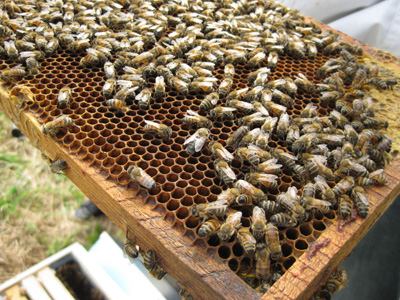News
» Go to news mainHoney bee losses in North America ‑ A free public lecture
“For modern man, bees serve not only as essential coworkers in agriculture, but also as indicators of the state of the environment, and witnesses of an intact association between mankind and nature.” Jurgen Tautz 2006

Dr. Dennis vanEngelsdorp with be giving a free lecture on the subject of Honey Bee Losses in North America: Causes and Consequences.
Friday, March 7th
7:00 p.m.
Dalhousie Agricultural Campus Alumni Theatre
This event is being cohosted by Dalhousie University and the Nova Scotia Beekeepers Association and is open to the public.
If you have never enjoyed the simple pleasure of peering into a beehive and watching as the ladies go about their selected duties, you are surely missing out. Their organization and well-timed movements are so in tune with one another that their majesty is akin to Ludwig van Beethoven’s 5th symphony.
Bees are marvelous creatures who do so much more for us than just make honey. Not that the $170 million in honey sales they bring to the Canadian economy isn’t a sweet reward. They also produce other valuable products such as beeswax, pollen, propolis, royal jelly, and most importantly they pollinate flowers. Pollination is an ecological service vital to preserving the planet’s biodiversity. It also hugely impacts our food supply. Many agricultural crops such as apples, blueberry, indeed most fruits and vegetables as well as crops razed for livestock are pollinated by honeybees. Some estimates put 35-50% of the global food supply as being dependent on pollination by bees.
Unfortunately, not all is well with the bees. Beekeepers are facing unprecedented challenges such as emerging pests and disease, pesticide poisonings, monoculture crops and high winter losses. These problems are taking a toll and it is increasingly difficult to sustain.
All is not lost for man’s smallest domesticated animal. Working to address some of these issues is Dr. Dennis vanEngelsdorp, a Research Assistant at the University of Maryland.
Dr. vanEngelsdorp is one of the leading researchers attempting to understand colony decline in general and specifically Colony Collapse Disorder (CCD), a phenomenon where worker bees disappear from hives en masse. His research focus involves using epidemiological approaches to understanding and (importantly) improving honey bee health.
Recent News
- Submissions to TV screens
- Three alumni, four rings
- Upcoming Workplace Wellness activites ‑ May
- A home away from home – Barley Party 2024
- Dalhousie University investigates natural therapeutics to manage cancers of companion animals
- Dr. Derek Lynch honoured for Outstanding Leadership in Organic Science
- Lifting Nova Scotia Workshop
- Truro Students Shine at MacRae Library Research Poster Competition
